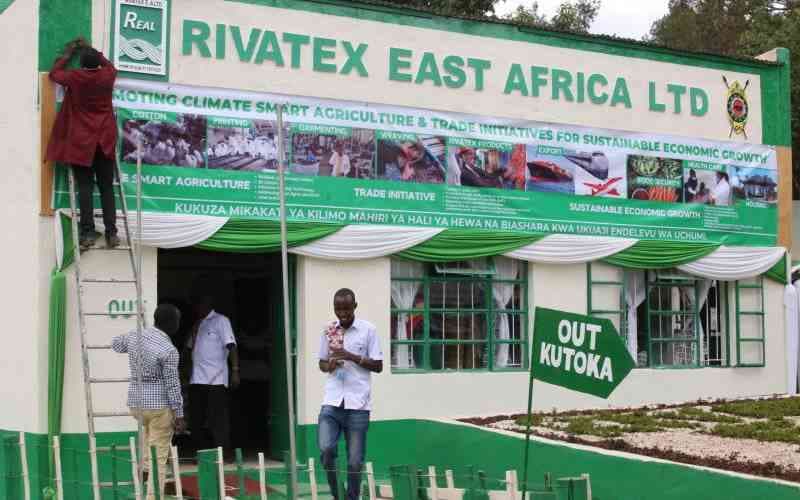We're loading the full news article for you. This includes the article content, images, author information, and related articles.
The strategic lease of the Eldoret-based textile manufacturer to Arise IIP aims to restore full production capacity and create thousands of jobs, providing a critical market for Kenya's cotton farmers in a landmark deal for the government's industrial revival agenda.

ELDORET, KENYA – The financially troubled Rivatex East Africa Limited has been handed a significant lifeline after the government leased its operations to Arise Integrated Industrial Platforms (Arise IIP) for 21 years. The new operator has pledged to inject Sh2.6 billion ($20 million) to revitalise the iconic textile manufacturer, a move officials say is pivotal for Kenya's manufacturing sector and cotton value chain.
The handover, confirmed on Tuesday, October 28, 2025, by the Ministry of Investment, Trade, and Industry, marks a strategic shift from state control to a private-led revival for the Eldoret-based firm. According to Industrialisation Principal Secretary Dr. Juma Mukhwana, the deal is designed to end the company's decades-long reliance on the exchequer and address deep-seated operational and financial challenges. Arise IIP, which operates industrial and textile facilities in several African countries including Benin and Togo, will take over all operational costs and pay a fixed lease amount to the National Treasury.
The agreement follows years of struggle for Rivatex, which, despite receiving over Sh7.5 billion in government funding for modernisation, has been operating at less than 10% of its capacity. A recent report by Auditor General Nancy Gathungu highlighted the firm's precarious financial state, revealing accumulated losses of Sh3.04 billion and debts exceeding Sh140.92 million as of June 2023. These liabilities include significant sums owed to suppliers and the Moi University Pension Scheme.
The transition involves a significant restructuring of the workforce. Prior to the handover, Rivatex had 625 employees, including 347 on contract and 278 on permanent terms. As part of the takeover, all employees were released through a redundancy process, with the government settling outstanding salaries amounting to Sh94 million. Dr. Mukhwana stated that Arise IIP will initially retain 118 employees to ensure operational continuity and institutional memory.
While this has led to immediate job losses, Arise IIP Chief Executive Officer George Olaka has projected the creation of up to 5,000 jobs once the factory is fully operational. The investor plans to inject substantial capital to upgrade machinery, enhance efficiency, and innovate product lines, aiming to restore the factory to its former glory when it produced over 15.7 million metres of fabric annually before its decline in the late 1990s.
A cornerstone of the revival plan is the revitalisation of the local cotton supply chain. For years, Kenya's textile mills have been hampered by an inadequate supply of quality local cotton, forcing them to import the majority of their raw materials. PS Mukhwana clarified that Rivatex's recent collapse was due to mismanagement and lack of funds to purchase local cotton, not a shortage of it.
Arise IIP has already committed to supporting local agriculture by providing 1,500 tons of certified cotton seeds to farmers. This initiative is expected to create a stable and predictable market for cotton growers in at least 24 counties, particularly in the North Rift and other arid and semi-arid lands. The move aligns with the government's 'Buy Kenya, Build Kenya' policy and its broader goal of boosting the manufacturing sector's contribution to the national GDP.
The path to profitability for Rivatex is fraught with challenges that have plagued Kenya's textile industry for decades. High operational costs, particularly for electricity, have been a major impediment, making Kenyan products less competitive than those from countries like Ethiopia. The Parliamentary Committee on Trade, Industry and Cooperatives has previously cited exorbitant energy tariffs as a key reason for Rivatex's underperformance despite heavy investment.
Furthermore, the firm will have to contend with intense competition from cheap imported textiles and second-hand clothes (mitumba), which dominate the local market. Addressing these systemic issues, including improving energy infrastructure and implementing effective trade policies, will be crucial for the long-term success of the 21-year lease. The success of this public-private partnership is being watched closely as a potential model for reviving other struggling state-owned enterprises in Kenya.
Keep the conversation in one place—threads here stay linked to the story and in the forums.
Sign in to start a discussion
Start a conversation about this story and keep it linked here.
Other hot threads
E-sports and Gaming Community in Kenya
Active 9 months ago
The Role of Technology in Modern Agriculture (AgriTech)
Active 9 months ago
Popular Recreational Activities Across Counties
Active 9 months ago
Investing in Youth Sports Development Programs
Active 9 months ago